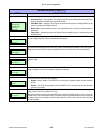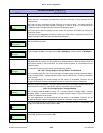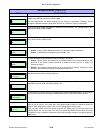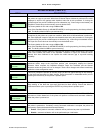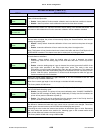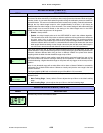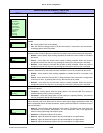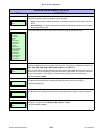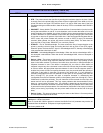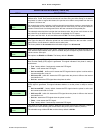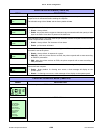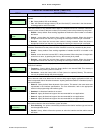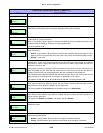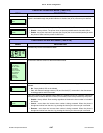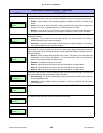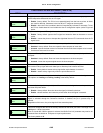
Unit 4: Printer Configuration
GL408-412e Operator Manual
4-42 PN: 9001163A
Allows the serial interface protocol type to be selected to meet host interface requirements.
•DTR - The printer controls the data flow by sending this hardware signal to the host. If there
is enough room in the printer buffer, the printer will send a high signal; if the buffer is full, the
printer will send a low signal. DTR tells the host if it is safe to send more data (if the host
sends data during an unsafe condition, data will be lost). DTR is not available when RS422 is
selected.
• XON/XOFF - factory default. The printer controls the flow of communication from the host by
turning the transmission on and off. In some situations, such as when the buffer is full or the
timing of signals is too slow/fast, the printer will tell the host to stop transmission by sending
an XOFF character. An XOFF character is sent when the quntity of empty bytes in the buffer
is less than or equal to 25 percent of the buffer size. If the host keeps sending data after an
XOFF is sent, the printer firmware will continue to send an XOFF for every 16 characters
received. When cleared, the printer will resume receiving data (XON). The data does not
have any End of Text Codes; XON/XOFF is a non-block protocol.
• ETX/ACK - End of Text/Acknowledge. The host controls the flow of communication to the
printer by sending a block of data and ending the block with an End of Text (ETX) signal.
When the printer receives the EXT signal, it acknowledges the ETX, thereby acknowledging
it has received the entire block of data.
• ACK/NAK - Acknowledge/Negative Acknowledge. When the device acknowledges ACK, it
has accepted a transmission. When the device acknowledges NAK, it has not accepted a
transmission.
• Series1 1 Char - The printer controls the flow of communicaiton from the host by turning the
transmission on and off using repsonse characters sent to the host. If the quantity of valid
bytes in the buffer reaches 75 percent of the buffer size, the online or offline and buffer full
response character is sent. If the buffer is completely full, an online or offline buffer full
response is sent every time a character is sent to the host. Whever the printer state changes
to online or offline, the appropriate response character is sent. If the idle response option is
enabled, the printer will send a response character every two seconds while the quantity of
valid bytes in the buffer is less than 75 percent of the buffer size. If a poll character is
received (configurable from the Poll character xx Hex option on the operator panel from the
Hex 0 through FF), the printer will send a response character in milliseconds later
(configurable from the Poll character xx MS on the operator panel from 0 throgh 30). This in
milliseconds is called the poll delay. The poll character will be removed from the input data
stream and will not be processed. This may cause problems with the transmission binary
data (e.g., control codes, bit image, etc.). If a poll delay is started due to the receipt of a poll
character and another poll character is received, the second poll character has no effect and
is removed from the input data stream. If a transmission (from buffer full to empty or online to
offline) occurs during a poll delay, the new printer state will be sent at the end of the poll
delay.
• Series1 2 char - This protocol behaves exactly the same as the Series 1 Char except there
is a two-character response to the host.
This menu configures the amount of memory allocated for the serial port buffer. The range is 1 to
16 Kbytes in 1 kbyte increments.
Note: If a baud rate 19200 or greater is selected, the Buffer Size in K parameter may need to be
increased from the default to 16 Kbytes to improve performance.
The factory default is 16.
SERIAL INTERFACE MODE (TABLE 4-4)
MENU DESCRIPTION
Data Protocol
DTR*
Buffer Size in K
16*



